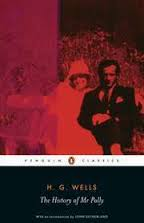The History of Mr Polly by H G Wells
1910
Most Victorian novels were about prosperous people. Yes, they sometimes had money worries, but they weren’t urban working class. Dickens changed all that, and people from all parts of the class spectrum became suitable subjects. However, the petit bourgouise, the shop keeping class, technically bosses in that they were self employed, but dirt poor nonetheless, were largely ignored. That changed with the Grossmiths’ ‘Diary of a Nobody’ in 1892, and ‘The History of Mr Polly’ is an early entry in this ‘little man and his troubles’ or ‘white collar’ genre.
‘Mr Polly’ opens with him sitting on a stile, grumbling. He hates his life. He doesn’t love or particularly even like his wife, he finds his job as a shopkeeper dull and unfulfilling, and he mourns the absence of any romance or culture in his life. He also suffers horribly from chronic indigestion, representative of his dissatisfaction with life. The first half of the novel is a flash-back from this point, chronicling how he has always felt this way, more or less, and how he reaches this nadir. He settles on suicide as the only logical escape, and having made that decision implements his plan quite calmly. Inevitably he botches the job, and in the process burns half his street down. Ironically this provides him, in the form of insurance money, an escape route, and he runs away. The final section of the novel sees him settled as a handyman at a country pub, living a bucolic but largely culture-free lifestyle that seems to suit him. This life is threatened by uncle Jim, the nephew of the landlady, a thug who menaces her for money. Polly discovers the hero inside himself, stands up to Uncle Jim, and in comic bumbling fashion defeats him.
Polly is quite an engaging anti-hero. He reminded me of Anthony Burgess’s Enderby, one of my comic legends. He has a kind heart, and does his best to avoid causing harm. he takes the hardships in life as they come, and looks for pleasure in small things. He has a way of mangling the language which is intended as humorous, and which just about manages to raise a smile. Despite his ineptitude in most things, somehow he manages to come out on top. Some of the set-piece scenes in the novel, such as his father’s funeral, where remote relatives descend on the wake and have a great day insulting one another, are enjoyable. If one looks hard for more serious themes, such as any traces of Wells’ Fabianism, they can be found, but the novel is not openly political. The main ‘message’ of Mr Polly’s history is that one should be true to oneself:
“when a man has once broken through the paper walls of everyday circumstance, those unsubstantial walls that hold so many of us securely prisoned from the cradle to the grave, he has made a discovery. If the world does not please you, you can change it. Determine to alter it at any price, and you can change it altogether. You may change it to something sinister and angry, to something appalling, but it may be you will change it to something brighter, something more agreeable, and at the worst something much more interesting. There is only one sort of man who is absolutely to blame for his own misery, and that is the man who finds life dull and dreary”
Mr Polly didn’t have such a terrible life. While slowly going bust in his shop, he didn’t suffer the privations many people experienced, and enjoyed many of the comforts of his Edwardian idyll – an idyll that was to be lost forever just a few years after this novel was published.
THE READING BUG



No comments:
Post a Comment